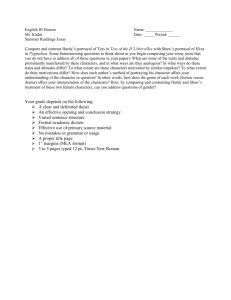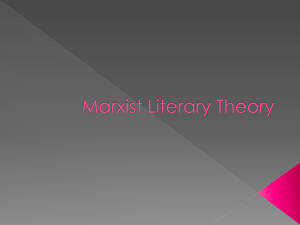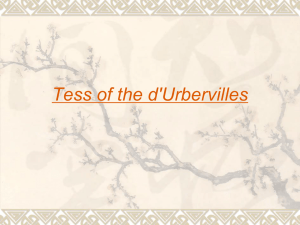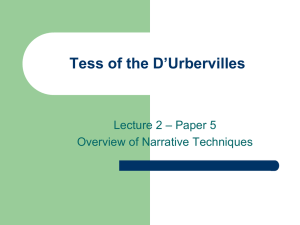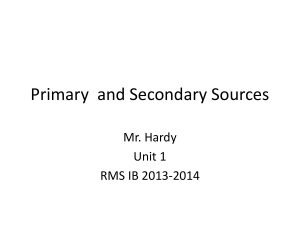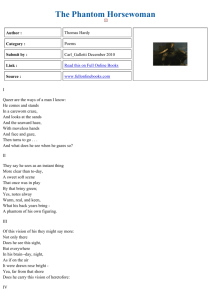Cunningham Tess
advertisement
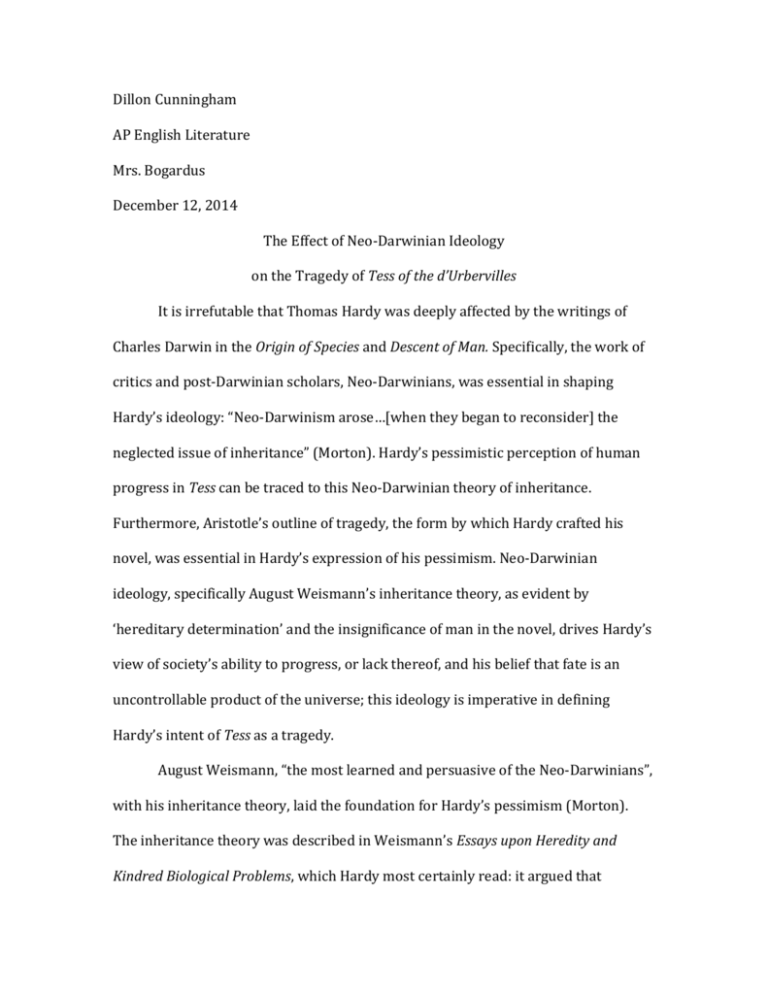
Dillon Cunningham AP English Literature Mrs. Bogardus December 12, 2014 The Effect of Neo-Darwinian Ideology on the Tragedy of Tess of the d’Urbervilles It is irrefutable that Thomas Hardy was deeply affected by the writings of Charles Darwin in the Origin of Species and Descent of Man. Specifically, the work of critics and post-Darwinian scholars, Neo-Darwinians, was essential in shaping Hardy’s ideology: “Neo-Darwinism arose…[when they began to reconsider] the neglected issue of inheritance” (Morton). Hardy’s pessimistic perception of human progress in Tess can be traced to this Neo-Darwinian theory of inheritance. Furthermore, Aristotle’s outline of tragedy, the form by which Hardy crafted his novel, was essential in Hardy’s expression of his pessimism. Neo-Darwinian ideology, specifically August Weismann’s inheritance theory, as evident by ‘hereditary determination’ and the insignificance of man in the novel, drives Hardy’s view of society’s ability to progress, or lack thereof, and his belief that fate is an uncontrollable product of the universe; this ideology is imperative in defining Hardy’s intent of Tess as a tragedy. August Weismann, “the most learned and persuasive of the Neo-Darwinians”, with his inheritance theory, laid the foundation for Hardy’s pessimism (Morton). The inheritance theory was described in Weismann’s Essays upon Heredity and Kindred Biological Problems, which Hardy most certainly read: it argued that inheritance held no influence over social virtue, that it was quite detrimental to progress, and cast doubt over humanity’s ability to progress (Morton). This ideology is essential in understanding Hardy’s intent; Tess is rooted in this perception of inheritance and human progress as Tess Durbeyfield fails to better herself as a result of her inherited traits. As the novel progresses, Hardy provides social commentary on inherent human qualities and human insignificance among nature to suggest he, too, was doubtful of human progress. Hardy utilizes the Aristotelian model of tragedy to reveal this: “the narrative flows smoothly up to the peripeteia [turning point in the plot] of Alec’s stabbing and afterwards ebbs rapidly away with cathartic [emotional purging] idyll of Phase the Seventh, “Fulfillment”. In his presentation of hamartia [tragic flaw] and nemesis [retributive justice]”, Hardy utilizes hereditary determinism “to centre the interest solely and entirely in the individual face to face with the universe” (Morton). It is through this model of tragedy that Hardy emphasizes his Neo-Darwinian ideology; the form of the novel serves to highlight Tess’ confrontation with her inheritance, to expose the influence of hereditary determinism and the insignificance of humanity, through her realization of these realities. Hardy’s influence by Weismann lies heavily in his exposition of hereditary determinism: the “innate “wired-in” patterns of [human] behavior” (Morton). Through Tess’ hubris, ignorance, and subsequent realization of her lack of control of her fate, Hardy establishes his belief of the influence of human determinism on fate. The hubris and ignorance of Tess Durbeyfield lie solely in her belief that she can control her destiny; she spends the majority of the novel attempting to change herself and her future, an inherent human aspiration that Hardy views as foolish and unobtainable. This ignorance is a result of her refusal to learn history; her exclamation in the beginning of the novel, “what is the use of learning that I am one of a long row only…the best is to not remember that your nature and past doings have been just like thousands’” (Hardy, 99) serves to highlight her ignorance and juxtapose her human determinism with her eventual fate. The fate of Tess Durbeyfield is, too, characterized by this refusal to learn history: “her tragedy is absolute and is not relived by her undoubted nobility of character” (Morton). As the novel progresses, as Tess increasingly becomes victim of her own fate, she begins to understand her lack of control. After the death of her father John Durbeyfield, Hardy interjects to provide his opinion on the matter of fate, “flux and reflux – the rhythm of change – alternate and persist in everything under the sky” (277). Hardy’s commentary here serves to represent the educative process Tess is undergoing as the novel moves toward catharsis. Tess again expresses her developing understanding of fate when she exclaims “once a victim, always a victim: that’s the law” (261). These revelations serve to highlight Hardy’s perception of fate and its influence by human determinism. Tess’ initial hubris and ignorance, and her subsequent understanding, together function as social commentary on the inherent behavior of humans: her hubris and ignorance, her belief that she could control her fate, an intrinsic human belief, is the sole reason for her inability to progress. Hardy’s comparisons between Tess and nature throughout the novel serve to further his belief that fate is a product of inherited qualities; that Tess is doomed because of her heredity. In his recurring comparisons between Tess and nature, Hardy explicitly expresses his belief of human insignificance. One of the most profound such comparisons came in Tess’ encounter with the dying pheasants. The pheasants laid, “writhing in agony”, as they awaited their death, “except the fortunate ones whose tortures had ended…by their inability to bear no more” (218). Hardy provides this passage to compare the fate of beings in the natural world to the fate of humans; specifically, it highlights Tess’ insignificance, her non-unique fate, in the universe. Furthermore, Hardy’s description of the dead as “fortunate”, and dead only when they were unable to experience more “torture”, expresses his pessimistic view: his belief that pain is a product of fate, inevitable in nature, and will be inflicted without deterrence. This comparison truly expresses Hardy’s perception of fate, establishing his belief that the universe is unstoppable and fate is uncontrollable, that, despite Tess’ advancements, she, too, will only stop suffering when she is unable to bear more. The other most profound comparison came in an observation describing the generations of cows at Dairyman Crick’s farm; in it, Hardy exposes his belief of the affect of inheritance, “infinite cows and calves of bygone years, now passed to oblivion almost inconceivable in its profundity” (83). It is herein that Hardy emphasizes the “receding replications of the organic world” and therefore describes the fault of Tess’ heredity: “the thing ‘inherent in the universe’ which, valueless though irresistible, helps destroy her” (Morton). It is through her heredity, the inherited qualities from Tess’ ancestors, that, Hardy believes drives her fate. Angel describes the fault of Tess’ heredity after the wedding night, exclaiming, “I cannot help associating your decline as a family with…your want of firmness. Decrepit families imply decrepit wills, decrepit conduct” (182). Angel’s revelation directly connects Tess’ inherited qualities with the heredity explained with the cows; it establishes the perspective that tragic fate is a result of heredity: a belief directly influenced by Weismann’s inheritance theory. Critic Charlotte Thompson agrees upon the idea that Tess is a victim of her own heredity: “Tess’ tragedy…[lies] in the ability to perpetuate the past by…predetermined ends” (Thompson). Through Hardy’s comparisons of Tess to the natural world, he emphasizes his belief that human fate is of no distinct significance, rather it suffers the same fate as the organic world: receding “to oblivion” as a product of heredity. Wholly, Hardy’s ideology and the form by which the novel is presented establish the tragedy of Tess. The tragedy of Tess Durbeyfield is the product of NeoDarwinian ideologies within Thomas Hardy. August Weismann disposed Hardy to a pessimistic perception of human progress. Through the lens by which he consequently viewed the world, Hardy crafted the tragedy of Tess of the d’Urbervilles. He operates with the Aristotelian form of tragedy to achieve his message that progress is doomed by human determinism and inheritance: the move towards catharsis allows Hardy to reveal his belief through the education of Tess and the revelation of Angel. Furthermore, Hardy’s utilization of comparisons to nature provides a platform from which he establishes his belief in the insignificance of humans in the universe. As a whole, these literary techniques contribute to the reader’s overall perception of the fate of Tess Durbeyfield: “[the novel] hammers away at the tragic self-deception [of Tess with her belief of her control of her fate]” (Morton). It is with these literary techniques that Hardy truly expresses his message and subsequent intent of Tess of the d’Urbervilles to be a tragedy, the downfall of a woman due only to her uncontrollable fate and predisposed qualities. Works Cited Hardy, Thomas, and Scott Elledge. Tess of the D'Urbervilles. 3rd ed. New York: Norton, 1991. Print. Morton, Peter. "Neo-Darwinian Fate in Tess of the D'Urbervilles." Southern Review 7 (1974): 36-51. Print. Thompson, Charlotte. "Language and the Shape of Reality in Tess of the D'Urbervilles." ELH 50.4 (Winter, 1983): 729-62. Print.
